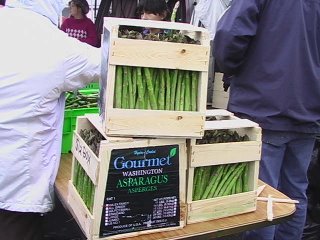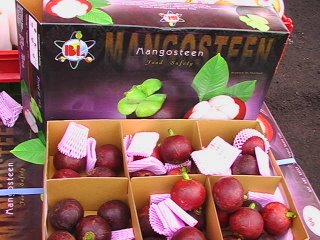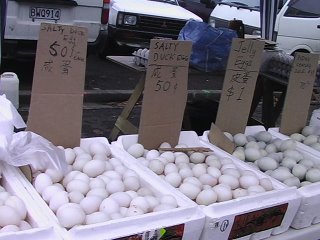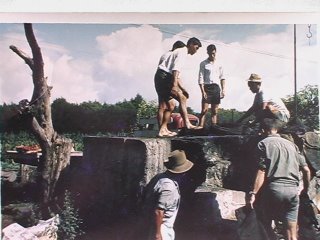Ping's Pie Cart - Pride of the WestBy Rhonda Bartle
Pie cart on Ariki Street
For more than 25 years, Ping's Pie Cart stood on a vacant lot next to the Army Stores on Ariki Street and served hot nosh to late night diners. After midnight, Ping became the most popular man in town.
Most of his patrons on a Friday or Saturday night would head first to the pictures at the State, the Regent, the Opera House or Mayfair, before heading to the back bar of the Royal for a sly pint after hours.
Or there was usually a dance to rock up to, first at the Trades Hall and later at the War Memorial Hall or the Star Gym. And after all that socialising, there was always the stop at Ping's for pea, pie and pud.
Ping, Ping the ChinamanIf he can't cook it, nobody can…
After midnight, Ping Choy Leong became the most popular man in town. Image Puke Ariki Pictorial Collection TS2006_1004.
Ping Choy Leong
Ping Choy Leong was Chinese, short of stature and long on patience. He wore a black apron and had big hands for a small man. He could pass a plate with one while pouring tea with the other.
A market gardener and former fruit shop owner, he began selling fast food in the 1950s. His caravan, with its duckboard at ankle height to keep patrons up off the pavement, and metal shutter over its narrow serving window, opened at 5.30pm each night and didn't close till dawn.
Though it was called a pie cart, the menu boasted 24 items, all variations on the usual theme of pies, steak, eggs and chips. Everything came with tea or coffee and you paid when the plate arrived.
Ping's reputation for cooking at the speed of light and delivering just as fast meant his loyal clientele quickly grew to impressive numbers.
And the food was always good. Legend has it that hungry revellers often sent an empty taxi to pick up an after party order on the strength of his fried egg sandwiches alone.
Having fun with Ping
People loved to bait Ping to see what he would do. They'd take the fish slice from out of the groove where he kept it next to the cooker and scratch their heads with it. Once, though it's never been proven, someone caught Ping doing his laundry in the dish washer. Next time Ping took an order, it was for "socks and underpants on toast."
One of the funniest yarns is about his so-called meat supply, when a local hunter apparently slung a bloody possum carcass across Ping's countertop. "That's the last you get from me! You don't get another until you pay me!"
There's one about the local fisherman arriving with a large, wet octopus and telling Ping to, "Cook this!" The same man was said to have once hooked his ute up to the caravan in a threat to tow it away.
There's a story that someone actually did take Ping's pie cart on a tiki tour. And word has it that Ping shifted his trays of eggs from out of the reach of punters, after they were stolen one at a time and then pelted up and down the street.
Ping and the police
Though rumour has it Ping's caravan was wired directly to the police station so a touch of a button would bring the law running, it was always understood that Ping could sort out trouble by himself.
"You behave or I call police!" he'd warn his most unmanageable diners. But stories exist that Ping often chased errant patrons down the street, swinging a meat cleaver over his head, while shouting loudly in his unfathomable English.
Ping's language was known by some as 'Chinese otherwise." But what sounded like abuse was possibly just his version of "Don't you *&^%$#@ come back!"
Yet, Ping was quite fair-minded. One New Plymouth woman recalls gathering up loose change dropped by blokes who'd been in the pub too long, and trying to give it back to the pie cart proprietor only to be told, "You find it, you keep it."
Henry Leong serves the long-haired crowd in 1975. Image Daily News. Copy from Puke Ariki Pictorial Collection TS2006_1003.
Henry Leong
If Ping was world famous in New Plymouth, then Henry Leong, Ping's cousin, and Daisy Lee, Ping's niece, weren't far behind. For years they worked behind the counter, first with Ping and then without him when Ping retired and Henry took over the business.
Henry was a small man too, but according to Jock Ross, a young constable at the time, he would have made a brilliant policeman. The man could pour oil on troubled waters as easily as tomato sauce on pies.
Even today, Henry Leong has a fresh, infectious laugh despite the fact he's old enough to have retired many moons ago. "I worked at the pie cart for 14 years, on and off," he says. "From 16 to 30."
His cheerful voice comes down the phone from Tauranga where he moved post-pie cart, post-the Chalet Coffee Lounge, post-his Golden Phoenix restaurant in Currie Street.
When asked if he enjoyed the late night work, his tinkling laugh rings out even stronger. "I wouldn't say I enjoyed it. I meet a lot of people. Some crazy people, some good people. We had doctors, mayors, city councillors; all came to the pie cart.
"Lot's of funny people, you know? But mostly quite good. Usually have the rugbies and singers like the Howard Morrisons and Eddie Lowes and people like that."
The most famous man Henry served was All Black Ross Brown and the most popular order of the day was always pea, pie and pud. "After dances, after pictures, after parties, after pub, people just come in. Even rough people were sort of friends. We treated everybody the same, no matter. People from the street. Even Mongrel Mob.
Always treated them the same."
Sometimes there'd be impromptu sing-alongs, when a guitar would suddenly appear and everyone launched into song.
Henry has no idea how many pies were sold over the years. "Hundreds. Maybe eight or nine dozen a day. Might have made more money if we make those pies ourselves," he says. The next popular choice was steak and eggs, followed by those famous fried egg sandwiches.
He only closed early once, on a single day in February 1971 when downtown New Plymouth flooded due to heavy rain. "Water up to the parking meter," Henry chortles. "But we didn't float away. No. No. No. No damage either. We just close down and go and have a look around."
His voice drops to a whisper. "When we close for good, we had sad people, you know? One woman was crying outside."
On the job in 1975 - the lovely Daisy Lee. Image Daily News. Copy from Puke Ariki Pictorial Collection TS2006_1001.
Daisy Lee
Even today, Henry and Daisy are remembered as "lovely, lovely people," and there's no doubt that Daisy was the loveliest of all.
Rumour has it the young men, who worked at the Social Security Department directly across the road, would wander into the typing pool late in the day, not to chat up the typists but to stand on tip-toe at the window, trying to catch a glimpse of Daisy with her beehive hairdo and her short-short mini skirts.
To Daisy, those days seem a hundred years ago. "I was only young, for God's sake," she giggles." It's not surprising she was such a stand-out babe back then because, in 2006, she still has the figure, the hair, the smile. And she's still in the food industry, serving customers with her customary charm at the Aromas Café in Devon St.
The speed with which she and Henry worked together was legendary. They developed a kind of sixth sense. "It was like we knew what the other was thinking. Besides, I love him like my brother. He's such a great guy. I would have done anything for him. But we did work well together."
After Ping's closed, she continued to work with Henry at the Chalet Coffee Lounge in the Manchester Arcade.
She says the era spent behind the counter at the pie cart was a memorable one. "It was a good time to be a teenager, with only beer, and no drugs or hard alcohol."
Coming from a big family meant she enjoyed the customers and, like Henry, made it a rule to treat everyone the same. The police, too, were always friends and never the enemy.
When the pie cart closed, for some strange reason, she took the menu boards home with her and stored them in the basement. Today's she's quite pleased, as they're a tangible link to the past.
An early shot of Ping and his young family, with Henry on the right. Image Puke Ariki Pictorial Collection TS2006_1005.
Jock Ross - policeman
Talk to anyone of a certain age and memories of Ping's Pie Cart flow like mushy peas. Jock Ross, who was on the beat during its heyday, says it was a wonderful place for young coppers to go for a feed at 3 o'clock in the morning.
"Henry was very good to us, serving us great plates of steak, eggs and chips at Henry's prices. We looked after Henry and he looked after us, but you didn't abuse it. No one ever abused it."
He has no doubt the meat cleaver story is true, though he says Ping would never ever have picked a fight. "Ping was a man who wouldn't take any nonsense, and he and Henry together would have been quite formidable if they'd decided to lose their rag. But there was no aggression with them at all."
Jock, newly arrived from Glasgow, says Henry could usually break up a fight with a simple look or phrase. "I knew, if the chips were down - if you'll pardon the pun - Henry could look after himself. Henry had the gift of the gab and his English was probably better than mine!"
On the other hand, he doubts the tale of the panic button hooked directly to the police station is for real. "Ping might have had a big red button, but it wouldn't have been connected. Not in those days. He had a whistle that he'd blow if there was trouble, though there was never a lot of trouble, just usually a couple of punchies (sic)and then it was all over."
And the police always attended knuckle-ups once they heard a fight was on. "Usually it got back to us. Someone would come rushing in the front door of the station and say there was a punch up, or a taxi would ring us, or scream up out front and we'd all jump in the back and shoot off down there."
When Ping's closed, even the force went into mourning. "We weren't very happy. We were quite upset. It was hugely popular. I never heard a bad thing about Henry and I remember him with great affection. He was a terrific guy."
An original Ping's menu in shillings and pence: Image Puke Ariki Pictorial Collection TS2006_1006.
Pie cart poscript
It's not hard to imagine the hole the pie cart left when the vats were turned off and the tables cleared for the last time in March, 1975.
For two and a half decades, Ping's had squatted on its familiar concrete pad, with a few stools and tables at one end, serving all who fronted up.
It had fed bodgies and sailors and long-haired louts imitating The Beatles, as well as those kissing couples who had met at the Be-Bops dance on Saturday night. A rowdy witness to a myriad of social trends, even 10 o'clock closing had failed to quiet the tills.
In 2001, in the wake of an announcement of the name for the grand new library and museum which would occupy Ping's old site, a local wit was prompted to write a letter to the editor of Taranaki Daily News.
It ran under the heading A Steak in the City's Heritage: "I was interested to read last Saturday's Daily News that the full name for the project was "Puke Ariki Information, Knowledge and Heritage Centre for Taranaki.
"If we take the first letter of each word, we come up with PAIKAHCFT. If we drop three letters and add one, we could come up with Pai Kart."
The letter continued: "Those of us over 40 can well remember the Pai Kart. This was a truly multicultural centre, a place of huge knowledge where I, personally, had my heritage explained to me on several occasions…This was truly a centre for the exchange of information, a place where people could gather, enjoy a good feed and take part in interactive displays - like police training exercises, or watching couples frolic in the doorway of the Army Stores, or enjoy the pleasure of New Plymouth's first and only outdoor urinal."
And ended: "To think all of this is gone only to be replaced with a stuffy and boring museum and library that is going to cost the ratepayers millions of dollars - a civil disgrace, I'd say. I demand the name Puke Ariki etc be replaced by Pai Kart, and all the people who support me should gather at the Wind Wand at 3am tomorrow. I know the Pai Kart would attract a far better class of punter."
The response was a small one-liner. "Bring back Ping's and get rid of Puke Ariki."
The one time Ping's closed early was during the flood of 1971, when water rose up to the parking meters in town. This photo was taken outside Whites in Devon Street: Image Puke Ariki Pictorial Collection.
Published 28 April 2006
Comment on this StoryAdd your own Storyhttp://www.pukeariki.com/en/stories/newtaranakistories/pingspies.asp








